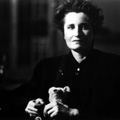Season 5
from april 29th to may 1st, 2011
at 2pm and at 4pm
at the International Antiquarian Book Fair
at the Grand Auditorium of the Grand Palais, Paris
 © Opale
© Opale
Elfriede JELINEK
prix Nobel 2004
Elfriede Jelinek was born on the 20th October, 1946, in the town of Murzzuschlag in Austria, to parents whose backgrounds were very different, but in both cases representative of the Austria of the period.
Her father was a Jewish chemist of Czech origin, employed in researching weapons between 1941 and 1945. In this way, he escaped the persecution which led to the death of many members of his family. Politically engaged, a socialist, it was to his influence that Jelinek attributed at least a part of her desire to write, and to use words as weapons.
Elfriede's mother, an authoritarian catholic, came from an upper middle-calss Viennese family and saw to the education of her daughter, monitoring her progress closely. Jelinek took piano, organ, and flute lessons, and at the age of 16 embarked upon studies in Musical Composition at the Vienna Conservatory. After finishing her secondary education, she read Theatre and History of Art at the University of Vienna, all the while continuing with her musical studies. By the age of 20, she had led a very sheltered life with little experience of popular culture. She was rarely permitted to consort with her peers. When she discovered literature she instantly became a avid reader. She read indiscrimantely anything she could find including comic strips, romantic fiction and detective novels.
During her childhood and her adolescence, she was taken by her mother on several occasions to psychiatrists, for hypermotricity and later, depression. It was during this period that her father, who himself suffered from mental illness ( a disorder Jelinek attributes to his past in the Nazi factories as a chemist), fell deeper into depression. He died in a hospital in 1968, when Jelinek was 22 yeas old.
After this she began to express her revolt through literature. At a young age she began to write poems, which were firstly published in several important Austrian avant garde reviews, Protokol and Literatur und Kritik. Despite her young age she immediately received praise. In 1969 she was awarded " The Young Austrian Culture Week Poetry and Prose Prize" and "The Austrian University Students' Poetry Prize." This second prize was given to her for as collection of subversive, indeed libidinous poems which provoked the indignation of the local press who protested " Where is the Austrian state heading if it rewards such idiocy!"
Looking for a broader narrative space in which to express her ideas, she turned to the novel, where her writing began to tend towards more stringent social criticism. Her first novel, "We're decoys baby!" appeared in 1970; the title alone revealing a resistance against the transmission of popular culture through a language that no longer serves as a medium, but as media discourse.
After some years spent in Berlin and Rome at the beginning of the 1970s, Jelinek married Gottfried Hungsberg in 1974, the year in which she joined the Communist Party. "Not in order to glorify East Germany or the Soviet Union. I thought that in this Austria there should be a voice speaking out against consensus, an opposition." In 1991 she left the party, along with its two presidents, Susanne Kohn and Walter Silbermeyer.
Her following novels, Women as Lovers and The Rejects express through an iconoclastic and satirical tone her refusal to accept a language that is nothing more than the pawn of the power structures. She rewrites with bitterness and irony all the discourses of power (industrial, political, emotional, cultural, of the media) which mechanise and shackle individuals, and especially women.
At the same time, Jelinek was writing radio plays. She has also been a very active playwright - theatre being an ideal format for her polyphonic monologues and prismatic texts. Her corpus consists of some 30 pieces. Talented and with diverse interests, she has also translated Thomas Pynchon, Georges Feydeau, Eugene Labiche and Christopher Marlowe.
In 1998, she published The Piano Teacher, her most autobiographical novel and her first major international success. Discovered by Jacqueline Chambon, at that time an editor at Actes Sud, then translated by Yasmine Hoffman et Maryvonne Litaize, she was the first author published by the editor in the newly set up Editions Jacqueline Chambon in 1988. It was in this novel that Jelinek explores the life of a young woman barricaded by taboos. In 2001 the novel was adopted for the screen by Michael Haneke, with Isabelle Huppert in the lead role.
In 1994 Die Kinder der Toten was published, a novel in which she returned once more to the theme of denial in the collective memory of an Austria which, according to Jelinek, sees itself as the first victim of Nazi aggression, and not as a collaborator. She has never baulked at excavating a repressed and traumatic past, be it her own or that of her native country.
Jelinek is in the front line of the battle against the rise of the far right in the form of Jorg Haider's FPO which, after its significant electoral success in 2000, entered government. The same year Jelinek prohibited the performance of her plays in Austria in protest. The far right launched a counter-offensive: in the working-class districts of Vienna posters were put up asking: "Do you like Scolten, Jelinek, Haupt, Peymann, Pasterk...or Art and Culture?
In 2003 she published Greed, before receiving the Nobel Prize in 2004. Too ill to go to Stockholm ("I am not currently in a state to talk to people"), she declared nevertheless that the Prize should not be considered as "a flower in Austria's buttonhole."
Always ready to adopt any new media available, Elfriede Jelinek's writings can be found on her own internet site, www.elfriedejelinek.com

